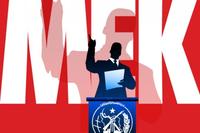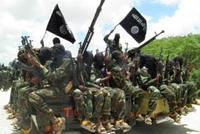-
Nuclear summit focuses on terrorist nukes

The Seoul nuclear summit focused on the risk of nuclear terrorism; there are two risks: first, fissile materials, which terrorists may use to construct a dirty bomb, is kept at thousands of medical, research, and industrial facilities around the world – often without sufficient security; second, constructing a Hiroshima-type bomb is not as difficult as we may think
-
-
U.S, Israel employ shady organization against Iran

Analysts have concluded that the United States and Israel may be in a strategic alliance with a former left-wing Iranian political group instrumental in the 1979 Islamic Revolution and the overthrow of Shah Rezi Pahlavi; the purpose of the alliance is to destabilize the current regime in Iran
-
-
The Transboundary Agreement is not just about the cost of gas and the environment
The Transboundary Agreement, which the United States and Mexico reached on 20 February, regulates oil and gas development in the Gulf of Mexico; before the agreement is ratified, there is a need to address serious security issues related to building more oil rigs in the Gulf – for example, the fact that the Mexican government cannot control its powerful criminal organizations, and that it will be easy for terrorists in a small boat to overrun one of these deepwater rigs
-
-
CDC: outbreaks linked to imported foods increasing
U.S. food imports grew from $41 billion in 1998 to $78 billion in 2007; as much as 85 percent of the seafood eaten in the United States is imported, and depending on the time of the year, up to 60 percent of fresh produce is imported; the increase in imported food has been accompanied by an increase in foodborne illnesses, with fish and spices the most common sources
-
-
The challenge of fighting Lashkar-e-Toiba
In her debut guest column, Bidisha Biswas, an associate professor of political science at Western Washington University, explores the threat that Lashkar-e-Toiba poses to the United States as well as India and Pakistan and what can be done to stop the extremist group
-
-
DHS to work with Netherlands on cybersecurity
On Wednesday DHS Secretary Janet Napolitano signed a letter of intent to work with the Netherlands on several critical cybersecurity initiatives
-
-
Inspectors uncover Qaddafi’s hidden WMD stockpile
Last week international weapons inspector found clear evidence that the late Libyan dictator Moammar Qaddafi had large caches of hidden chemical weapons, despite making a promise to destroy all weapons of mass destruction weapons in 2004
-
-
Morocco changes offer U.S. “very important opportunity”
Homeland Security NewsWire’s Executive Editor Eugene K. Chow recently had the opportunity to chat with Robert M. Holley, the executive director of the Moroccan American Center for Policy; in their interview Holley discusses the implications of Morocco’s recent historic elections, the likely policies of the newly elected moderate Islamist party, and the broader consequences of the Arab Spring in Egypt and Libya
-
-
Minnesota banks to stop money transfers to Somalia

In an effort to cut off funds to Somali terrorists, banks in Minnesota will no longer support money transfers via local businesses called “hawalas”; Minnesota has the largest concentration of Somalis in the United States and officials fear that money sent from relatives living in the United States could be funding terrorist groups like al Shabaab
-
-
EU wants tech firm to stop selling surveillance gear to despots
Following the revelations in the Wikileaks “Spy Files” last week, the EU digital agenda commissioner Neelie Kroes will urge European technology firms to develop a strategy to avoid “selling despots the tools of their repression,” a practice she describes as “to say the least, bad PR.”
-
-
Early Egyptian election returns confirm Islamist trend
The immediate results of the Arab Spring so far have complicated the manner in which the United States protect its interests and negotiate regional issues, but these results also offer new opportunities; the news is not all bad for the United States: the Islamist parties which won in Morocco, Tunisia, and Egypt may use anti-American rhetoric, but their rise to power also means an increase in the influence of Saudi Arabia in the region; this will likely mean a more robust Sunni Arab containment posture vis-à-vis Iran and its Shi’a and non-Sunni allies (Hezbollah, Syria)
-
-
Chinese rare earth embargo would be “disastrous,” says mining executive
Mike Parnell, the CEO of U.S. Rare Earths, Inc., recently took the time to chat with Homeland Security NewsWire’s executive editor Eugene K. Chow; in the interview Parnell discusses the potential consequences of a full Chinese rare earth metal embargo, efforts to develop alternatives to rare earth metals, and the progress made in making the drilling process more environmentally friendly
-
-
U.S. probing use of U.S.-made surveillance technology in Syria
U.S. Department of Commerce officials are seeking to determine whether Blue Coat Systems of Sunnyvale, California, knew its equipment and software were being used by the Syrian government to monitor anti-government demonstrators. If Commerce find that Blue Coat knowingly violated technology export and licensing rules, it could fine the company up to $1 million.
-
-
Syria: the end game
The willingness of the Assad regime in Syria to unleash a brutal suppression campaign against the anti-regime movement, and the reluctance of outside forces openly to intervene – as they did in Libya — to curb the regime’s ability to use its military superiority to suppress the insurgency, have led analysts to argue that the Assad government can outlast its opponents and emerge victorious, if bloodied, from the this latest challenge; the emergence of the Free Syrian Army (FSA) – especially if aided by Saudi Arabia – and the move by Turkey to assume a more active role in Syria, may well spell the end of the regime
-
-
U.S. working closely with U.K. to secure 2012 Olympics
Yesterday U.S. and U.K. officials met in Washington, D.C. to discuss security plans for the upcoming 2012 Olympic Games in London; the United States will have more than 500 federal agents on hand at the event and is working closely with British authorities
-
- All
- Regional
- Water
- Biometrics
- Borders/Immig
- Business
- Cybersecurity
- Detection
- Disasters
- Government
- Infrastructure
- International
- Public health
- Public Safety
- Communication interoperabillity
- Emergency services
- Emergency medical services
- Fire
- First response
- IEDs
- Law Enforcement
- Law Enforcement Technology
- Military technology
- Nonlethal weapons
- Nuclear weapons
- Personal protection equipment
- Police
- Notification /alert systems
- Situational awareness
- Weapons systems
- Sci-Tech
- Sector Reports
- Surveillance
- Transportation
Advertising & Marketing: advertise@newswirepubs.com
Editorial: editor@newswirepubs.com
General: info@newswirepubs.com
2010-2011 © News Wire Publications, LLC News Wire Publications, LLC
220 Old Country Road | Suite 200 | Mineola | New York | 11501
Permissions and Policies
Editorial: editor@newswirepubs.com
General: info@newswirepubs.com
2010-2011 © News Wire Publications, LLC News Wire Publications, LLC
220 Old Country Road | Suite 200 | Mineola | New York | 11501
Permissions and Policies
